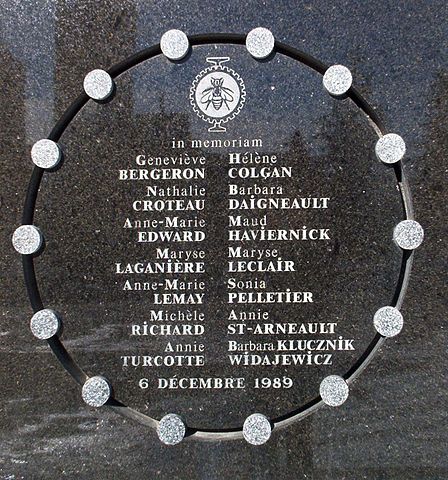It is 29 years since the Montreal massacre, when a shooter armed with a hunting rifle killed 14 women at the École Polytechnique, the engineering school of the Université de Montréal.
Each year at this time, gun control advocates call on the federal government to enact more effective measures to limit firearms. But those who manufacture, sell and own guns have considerable political clout, and they are pushing back hard.
The Trudeau Liberals arrived in office having made only small-bore promises on gun control. They did not, for instance, pledge to restore the long-gun registry, which the Chrétien government created in the aftermath of the Polytechnique massacre, and which the Harper Conservatives scrapped after they won a majority in 2011.
Trudeau promised modest measures like obliging manufacturers and importers to engrave all guns they put on the market with identifying markings. These would include the serial numbers, the name of the manufacturer, and the origin of the weapon, whether Canadian or foreign.
The Liberals promised to bring in this small measure with no delay, but instead have chosen to delay and delay and delay yet again. After a long wait, gun marking regulations were supposed to come into force on December 1 of this year, but at the last minute, the government deferred them for two more years, until 2020.
As we reported here a year ago experts such as criminologist Irvin Waller say gun markings would “make it a lot easier to trace the sort of guns that are being smuggled across borders, the sort of guns that get into the hands of the mafia and street gangs.”
When the Trudeau government announced the most recent delay this past November, its excuse was that it needed to find a way to mandate markings that did not impose “undue constraints or costs on firearms owners and businesses.”
Bill C-71 includes measures gun control advocates welcome
Organizations like the Coalition for Gun Control are not happy with the markings delay, but they are willing to cut the government some slack because it has introduced another series of firearm regulations in Bill C-71.
Bill C-71 has passed the House of Commons and is now before the Senate. It provides for a better screening process before anyone can purchase a firearm, obliges gun dealers to keep records of all weapons they sell, and provides for the transfer of the Quebec data in the defunct long-gun registry to the government of Quebec.
The 2012 Harper government legislation that scrapped the long-gun registry also stipulated that all the data it contained should be destroyed. At the time, the Quebec government was setting up its own registry and it went to court to force the federal government to preserve the data. Early in 2015, the Supreme Court, in a split decision, ruled Quebec had no right to the data, but the Harper government did not then go ahead and immediately destroy it. Now, finally, if and when the Senate passes C-71, the federal government will hand over the now somewhat outdated gun records to Quebec.
As for the measure in C-71 requiring gun vendors to keep records of all sales: those had been in force since 1971, but were abandoned as no longer necessary when the Chrétien Liberals created the centralized long gun registry.
In 2012, during debate and committee hearings on the Conservative bill to abolish the long-gun registry, the Harper government and gun lobby spokespeople assured Canadians that once the registry was gone, the old record-keeping system would be revived and maintained, so that authorities would still have information on all guns sold in Canada.
The minute the registry disappeared, however, the governing Conservatives — encouraged by their friends in the gun lobby — went to great pains to assure that gun merchants kept no records whatsoever of their sales. Harper’s Public Security Minister Vic Toews even went so far as to forbid provincial authorities from requiring such records.
The gun lobby is now characterizing C-71’s restoration of the 1977 record-keeping system as a back-door reinvention of the gun registry, which it definitely is not. C-71 merely makes mandatory what is already a standard retail sector practice.
The Coalition for Gun Control worries, however, that gun lovers and makers have loud voices and political influence that far exceeds their numbers. Even at this late date, the gun lobby could place obstacles in the way of C-71, as it makes its way through the Senate.
The anniversary of the Montreal massacre is an occasion for the advocates of gun control, whose views align with those of a large majority of Canadians, to make their voices heard.
Photo: By Bobanny/Wikimedia.org
Karl Nerenberg has been a journalist and filmmaker for more than 25 years. He is rabble’s politics reporter.
Help make rabble sustainable. Please consider supporting our work with a monthly donation. Support rabble.ca today for as little as $1 per month!




